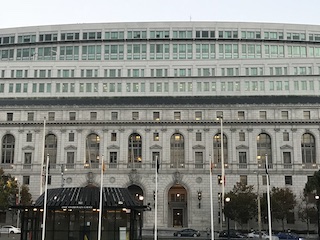Instead, appointed counsel must file a brief referring to matters that might arguably support an appeal and the judges of the appellate court must independently review the record to decide whether an appeal is frivolous. Id.
Because the federal constitutional right to counsel in a criminal case “extends to the first appeal of right, and no further,” the U.S. Supreme Court has refused to extend Anders to discretionary appeals or to appeals from orders in postconviction proceedings that seek to collaterally attack an underlying conviction. Pennsylvania v. Finley (1987) 481 U.S. 551, 554-555. Finley reasoned that Anders “establishes a prophylactic framework that is relevant when, and only when, a litigant has a previously established constitutional right to counsel,” and “since a defendant has no federal constitutional right to counsel when pursuing a discretionary appeal on direct review of his conviction, a fortiori, he has no such right when attacking a conviction that has long since become final upon exhaustion of the appellate process.” Finley, at pp. 554-555.
 Court of Appeal First Appellate District San Francisco
Court of Appeal First Appellate District San Francisco
California courts have followed Finley and similarly refused to extend Anders to require a Wende review in any appeal other than a first appeal of right from a judgment of criminal conviction.
However, California courts of appeal, while uniformly agreeing that Wende / Anders does not require independent review of appeals from post-judgment orders in criminal proceedings, are split on whether in certain contexts a court should nonetheless exercise discretion independently to review a summary denial.
It is against this legal background that James Freeman appealed an order that he violated a condition of his Post Release Community Supervision (PRCS) and asked the First Appellate District for an independent review under Wende.
A bit of factual background is helpful. In February 2017, Freeman sustained convictions in Marin County for assault with a deadly weapon (Penal Code § 245(a)(4)) and for buying or receiving a stolen vehicle (Penal Code § 495d(a)). He then went to prison but was released on PRCS in June 2018.
In December 2018, he was charged with possession of weapons and methamphetamine, admitted PRCS violations in exchange for dismissal of the charges and agreed to serve 110 days in county jail.
In July 2019, he was arrested in connection with a hit and run and again admitted a PRCS violation and was sentenced to 180 days in county jail.
In November 2019, he was arrested for possession of a replica handgun, a fixed blade knife, drug paraphernalia (a meth pipe) and again admitted a PRCS violation in exchange for a short jail term.
On February 7, 2020, the Probation Department filed a petition for revocation of PRCS on grounds that Freeman violated a term of his PRCS requiring him to submit to electronic monitoring. He apparently stopped charging his monitor, which caused the battery to die and he was arrested on February 6, 2020.
This time, Freeman did not admit a PRCS violation, so there was a hearing on the violation and he was found in violation, despite testimony from a senior analyst at a private company that assists Sonoma County in administering its electronic monitoring program that one of the two batteries installed in the monitor had no charge when installed. In other words, Freeman was “set up” to have an electronic monitor that lost its charge faster than expected.
The court found Freeman violated the terms of his PRCS and imposed a 180-day jail term (Freeman had 144 days of credit).
Freeman then appealed to the First Appellate District, which refused to conduct a Wende-type independent review of the ruling.
It pointed out that probation revocation proceedings are “constitutionally distinct” from criminal prosecutions. In re Eddie M. (2003) 31 Cal.4th 480, 504. Parole and probation revocation proceedings “in and of themselves do not concern guilt of any criminal charges, or risk any increase in the maximum terms of confinement to which persons are exposed by virtue of their underlying convictions.”
Moreover, the United States Supreme Court held that an indigent defendant has no per se constitutional right to appointed counsel in parole or probation revocation hearings. Gagnon v. Scarpelli (1973) 411 U.S. 778, 790-791. Therefore, Anders would certainly not apply, nor would Wende.
We bring this article to the reader’s attention because Wende is often greatly misunderstood and this case seems to help clarify when and why it does and does not apply.
The citation for the First Appellate District Court ruling discussed above is People v. James Freeman (1st App. Dist., 2021) 61 Cal. App. 5th 126, 275 Cal. Rptr. 3d 387.
For more information about PRCS and Wende issues, please click on the following articles:
 Court of Appeal First Appellate District San Francisco
Court of Appeal First Appellate District San Francisco